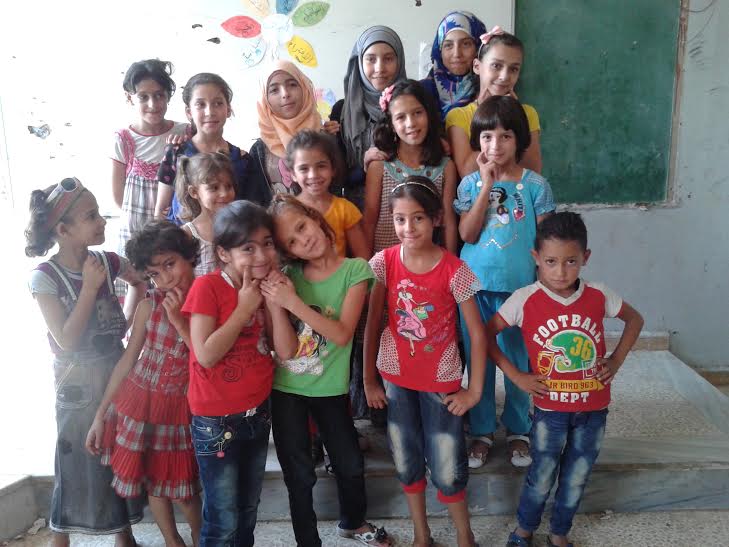Healing Children Traumatised by Violence

Omar, 11, sits drawing a picture depicting his memories of Haswiya, a village in rural Homs.
In early 2013, Omar’s entire family was killed during an attack on this village, an incident now known as the Haswiya massacre.
Omar vowed to become a fighter and join the junior ranks or “cubs” of the Islamic State (IS).
He was saved from this bleak future by the intervention of the Syrian Forearm group, which enrolled him in a psychological support programme for children aged between 11 and 15.
The programme was launched in the Al-Waar district of Homs in June 2015. Its sessions were developed by the Dutch organisation War Child, whose I Deal workshops have been implemented in more than ten conflict zones around the world.
The workshops in Al-Waar are run by a group of 22 volunteers, who want to combat the culture of bearing arms that has affected Syrian children.
“Over the past two years we have observed growing tendencies towards violence amongst children in opposition-held areas,” said Abu Fadi, head of the Al-Waar project.
“These actions are a response to the violence inflicted upon them by the regime.
“We also noticed that children had adapted to playing violent games related to warfare, and that some of them were joining extremist factions,” he said.
This inspired the launch of the project, with a budget of less than 5,000 US dollars.
“We started off by training a team of 15 young women and men to implement the I Deal programme. A group of our specialised trainers role-played with them via Skype to teach them how to run therapy sessions for children,” Abu Fadi said.
Those selected for the project were all secondary school graduates aged 19 and above with certificates of good conduct. Priority was also given to people specialising in psychology, education, childcare and sociology.
Once the team members completed their training, they were deployed to work in different children’s centres. Each group of five male and female volunteers was assigned to work with between 15 and 20 children.
The overall focus of the programme is nurturing a culture of peace and dealing with conflict without resorting to violence. Trainers teach children a number of techniques, including how to identify and express emotions, how to strengthen friendships and deal with peers, how to tackle daily challenges in a non-violent way and how to interact with grown-ups.
“We face many challenges during our support sessions,” said team member Umm Farhan.
“Many of the children are violent, while others think that attendance is a waste of time. To them, life is about weapons. They live in a world where armed men have the upper hand,” the 45 year-old said.
She explained that during the first session, children are asked to draw something that represents them. Many respond by drawing weapons or the banners of various military factions. Halfway through the course, the same request is made again, and around 90 per cent produce pictures unrelated to gun culture, such as a profession they aspire to work in.
“I think that despite our limited resources, we are making significant progress in countering child violence in the area. Children who refused to come to the centre without a knife in their pocket are now busy playing with their peers,” Umm Farhan said.
According to Sarah al-Dakheel, director of the Syrian Forearm association that funds the programme, launching the project was very problematic.
“Al-Waar was targeted by constant shelling and a tight siege had been imposed on the area. It was very difficult to find a safe location to operate from, and to ship training material into the district,” she said.

“Nevertheless, the Syrian Forearm insisted on funding the project due to its objective that seeks to nurture and rehabilitate children, who will hopefully rebuild what has been destroyed by years of conflict.”
She encouraged other organisations to fund children’s psychological support programmes.
One young widow who has benefited from the programme is 25 year-old Ranim.
“I was recruited to work on the project since its launch in Al-Waar. I started off as a volunteer, and later began to earn an income from the job,” she said.
Ranim explained that the programme has had a positive impact on her whole family, offering them financial, moral and psychological support.
“Every day I feel that I am doing something useful, which has reflected positively on my family,” she said.
“I also enrolled my two children in a psychological support workshop to help them deal with the loss of their father. They participated in many useful activities which taught them how to deal with family, friends and the wider community.”
Karam Mansour is the pseudonym of a Damascus Bureau contributor from Homs, Syria.
Read the Arabic version of this article here
